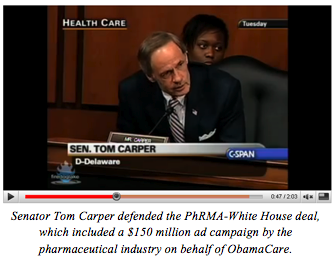How did the White House get the multi-billion dollar pharmaceutical industry to cave in as it was about to enter the health care debate? Good ol’ fashioned crony corporatism, that’s how.
As Beltway veterans are well aware, Congress and the White House routinely cut all sorts of backroom deals to keep various interest groups at bay. And ObamaCare’s incarnation in the Senate Finance Committee is no different.
The original deal was announced by Senator Max Baucus in June, stating that he, along with Barack Obama, had secured the “$80 billion commitment from the pharmaceutical industry to reduce Medicare prescription drug costs for seniors.”Apparently, the industry also agreed to do $150 million of advertising favorable to the plan.
According to the New York Times, “Under that pact, the industry agreed to various givebacks and discounts meant to reduce the nation’s pharmaceutical spending by $80 billion over 10 years. Shortly after striking that agreement, the trade group — the Pharmaceutical Research and Manufacturers of America, or PhRMA — also set aside $150 million for advertising to support health care legislation.”
What did PhRMA get in return for buying into Big Government? Apparently, the White House and Baucus agreed to limit the Medicare prescription drug discount to just $80 billion. Also, according to PhRMA head Billy Tauzin, he “extracted a promise from the White House to drop two important reforms: one, to allow the government to negotiate bulk rates for drugs in Medicare, and the other to permit the importation of cheap drugs from Canada (which was once an Obama campaign saw).”
All of which was much to the chagrin of the Hard Left. They thought Obama, Baucus & Co. should have shaken the pharmaceutical industry down for more. Wrote one blogger, “I believe that Baucus and Obama left a lot of money on the table. It was probably as high as $200 billion. I also know that Obama is smart and the deal does not sound like a smart guy’s move. In smart business, you play the game and bring the enemy (drug companies) into the open. That is what they did with Tauzin.”
As Mort Kondracke recently noted, PhRMA definitely got the high end of the deal. “Just $80 billion over 10 years—out of total U.S. pharmaceutical outlays of $3.3 trillion,” Kondracke criticized, apparently not satisfied with PhRMA’s contribution to reducing health costs.
Democrats in Congress were not pleased either. All of which culminated in Senator Bill Nelson offering an amendment that would have cancelled the deal and taken another $86 billion more from the industry. Senators John Kerry and Chuck Schumer expressed their support.
Fortunately for PhRMA, Senator Baucus killed the push, and saved the deal with a little help from one of his colleagues, Senator Tom Carper. Said Carper in committee when this came up, confirming the existence of the $150 million advertising agreement:
“I’ll tell you — if someone negotiated a deal with me and I agreed to put up say, 80 dollars or 80 million dollars or 80 billion dollars and then you came back and said to me a couple of weeks later — no no, I know you agreed to do 80 billion and I know you were willing to help support through an advertising campaign this particular — not even this particular bill, just the idea of generic health care reform? No, we’re going to double — we’re going to double what you agreed in those negotiations to do. That’s not the way — that’s not what I consider treating people the way I’d want to be treated. That just doesn’t seem right to me.”
Apparently, the deal won out with government agreeing—at least for the time being—not to soak the tremendously productive industry even more. But, buyer beware. In the end, PhRMA may get more than it bargained for. Once ObamaCare is enacted, and the pittance $150 million ad campaign over, Hard Left lawmakers like Kerry, Schumer and Nelson will not be satiated.
After Congress is done destroying the health insurance industry, it will have effectively played the “divide and conquer” strategy to perfection. And PhRMA will learn the lesson Churchill espoused decades ago: “An appeaser is one who feeds a crocodile—hoping it will eat him last.”
Robert Romano is the ALG Senior News Editor.


